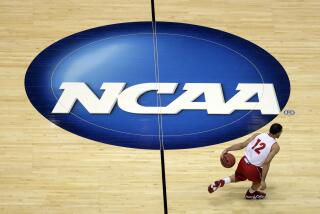The NCAA’s Foolish Heart Is Still Beating
Tori Allen is 16 years old, a rock climber. Jeremy Bloom, 22, is a freestyle skier. Eighty-three years old, Hugh Cunningham is a retired university professor of journalism. They believe the folks who run big-time college athletics don’t have a clue. Agreed.
Still, sometimes the NCAA panjandrums are more foolish than other times.
This time, in fact, they have about busted the Fool-O-Meter. They have ruled Jeremy Bloom “permanently ineligible,” as if he were Shoeless Joe Jackson or Charlie Hustle.
What Bloom did was play football at the University of Colorado and accept money for endorsing stuff in his other athletic life as an Olympic-class freestyle skier.
An NCAA poohbah named Carolayne Henry, chair of the NCAA Division I Student-Athlete Reinstatement Committee, explained her group’s confirmation of Bloom’s ineligibility by saying, in part: “Violations of amateurism laws are among the most serious because amateurism is the principle that separates college sports from professional sports.”
Were it not so insulting to one’s intelligence, one would break down in laughter at Ms. Henry’s use -- misuse -- of “amateurism.”
The NCAA dares declare in favor of amateurism? This is the same multibillion-dollar athletic organization that turns television network executives upside down and shakes them until every nickel clinks into the cash box. It wants us to believe in amateurism when coaches are paid $2 million a year?
Comic as that thought is, the real thigh-slapper is Ms. Henry’s insistence that amateurism is “the principle” that “separates” college from pro sports. Oh, please. Are we wearing our idiot faces today? The only principle that separates big-time college athletics from the professionals is the principle of cheap labor.
The NFL and NBA pay players for work that produces revenue. The NCAA does not. (And don’t give me that bullfeathers about scholarships, room and board until Coach K takes the same deal.)
What Ms. Henry touts as “the principle” can be defined, then, not as amateurism but as exploitation of employees powerless to change their working conditions.
Under pressure of the times, the NCAA did make allowances for athletes who want to turn professional in sports other than their collegiate specialty. Iowa track star Tim Dwight played for the NFL’s Falcons, accepting a $225,000 bonus. Chris Weinke returned from pro baseball to play quarterback for Florida State.
So why can’t Jeremy Bloom accept endorsement money in skiing while playing wide receiver at Colorado? In answer, Ms. Henry cites the “severity of the violation.” She must mean that endorsement money is severely different from NFL-bonus money.
Which makes no sense.
Hugh Cunningham always makes sense. He taught journalism at Florida for 25 years and served as assistant to the university president. To excite in athletes an interest in academics, Cunningham believes there should be athletics majors just as there are majors in dance, theater and music.
“A degree in athletics would afford many more opportunities than a degree in music,” he says. “And any academic course you can name -- history, ethics, philosophy, mathematics, literature, speech -- could be adapted to an athletic-major program that would hold the interest of these young men and women.”
During their competitive seasons, Cunningham says, athletes would not attend classes. Participation in varsity sports would not gain degree credit (as is the case at maybe three dozen big-time football schools, according to a recent Washington Post report). Instead, it would be treated as an “internship, the same as in music or journalism.” Academic work then would be built around that participation.
“Let’s be frank here,” Cunningham said. “We’re talking about African-American athletes. In my judgment, by not giving these athletes a meaningful education, we’re exploiting men who could fill one of the most-needed classes in our society, the educated black man. I believe an athlete at this level of football, basketball, cannot be stupid. It takes intelligence to play these intricate games and make instantaneous decisions under pressure.”
Well, that makes too much sense for the NCAA, no doubt.
The NCAA will be too busy chasing down Tori Allen.
She is my new favorite athlete. She is a little blonde, a junior at Lawrence Central High School in Indianapolis. I had never heard of her until Jeremy Bloom cited his NCAA travails as reason to worry about Tori Allen’s collegiate future. She won the rock-climbing gold medal at the Summer X Games. Her website banner: “She climbs like a girl. A girl monkey.” Her autobiography is Life Rocks. She is also a pole vaulter who has cleared 11 feet 10
inches and has been recruited by 40 big-time colleges.
Trouble is, she is paid to endorse rock-climbing gear. Perhaps trying to head off the NCAA, the Allen website insists, “Her life as a sponsored climber is totally separate from her life as an amateur pole vaulter.”
But Bloom, in an e-mail, framed the question that will be asked: “Who knows? Tori could become the best pole vaulter in Olympic history, or maybe the NCAA will end her career after high school.”
All I know is that I’m rooting for her against the NCAA fools.
Look, someone once asked what she wanted to be when she grew up.
She said, “A pole vaulter, a kindergarten teacher and a spy.”
How can you not love that?
More to Read
Go beyond the scoreboard
Get the latest on L.A.'s teams in the daily Sports Report newsletter.
You may occasionally receive promotional content from the Los Angeles Times.










